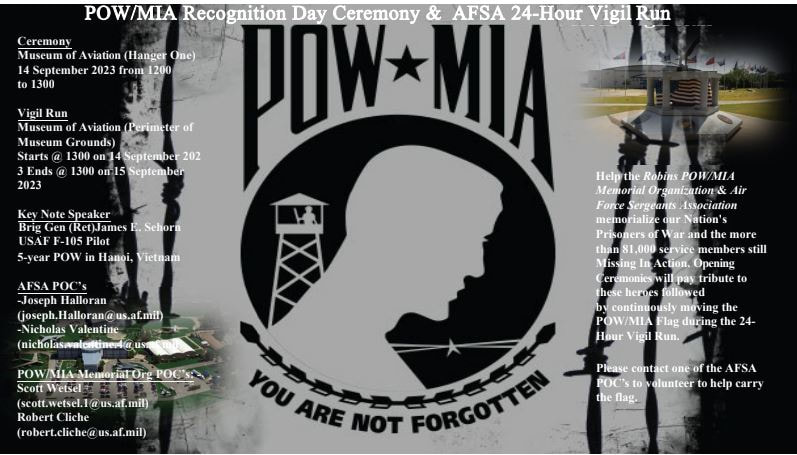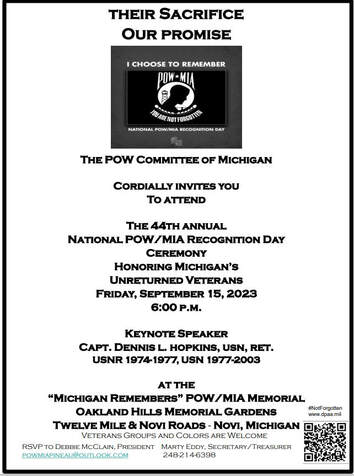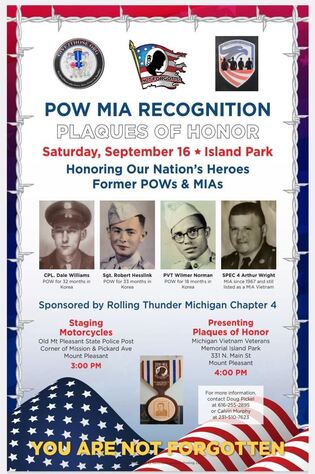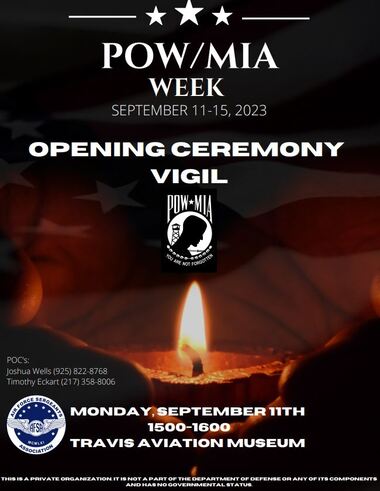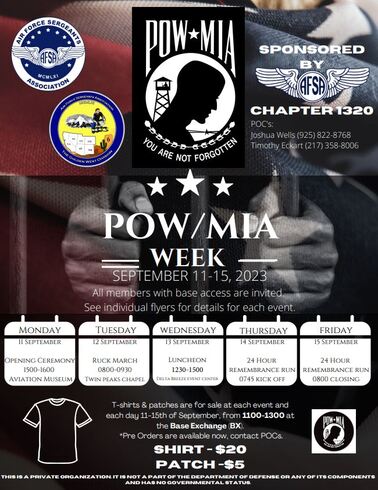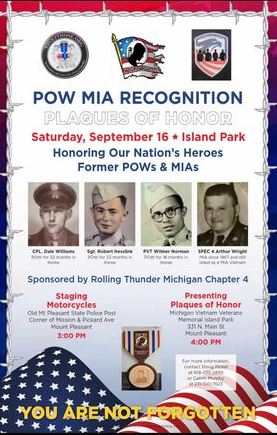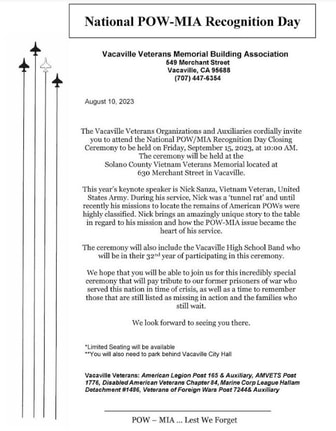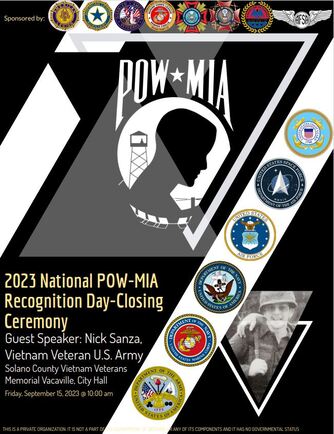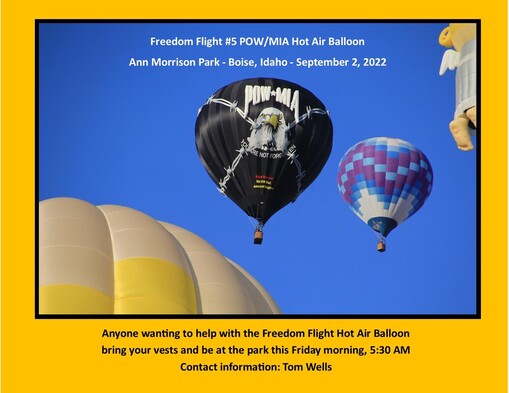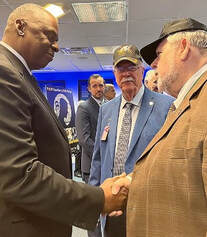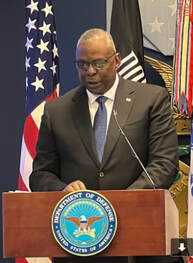2024 POW/MIA Recognition Day events
Happy New Year......
The third Friday in September (September 20th this year) is National POW/MIA Recognition Day.
This year the Palm Springs Air Museum will be holding its sixth annual POW/MIA event on that Saturday evening.
SATURDAY EVENING - SEPTEMBER 21, 2024
5:30 - Check-in (enter Miles Hangar south parking lot entrance)
6:00 - National Anthem and Prayer Service
6:15 – Introductions – Steve Frank (Co-founder of the ViVA POW/MIA Bracelet Program)
6:30 – Program- Featured Speaker: Colonel Lee Ellis – Former USAF POW and Author of “Captured by Love”. Inspiring True Romance Stories from Vietnam POWs. https://www.powromance.com/
7:30 - Social Gathering (wine and appetizers served by LULU of Palm Springs) and Book Signing.
Here is the link to a five-minute highlight edit of the 2023 Event. https://www.youtube.com/watch?v=tvFN3EPltQ
POWs, POW/MIA/KIA family members and bracelet donors will be in attendance. Cost: 20.00
Attire - Evening Casual (Men – shirt & slacks) (Ladies – something cool)
Please let me know if you:
(a) Plan to attend (number of guests)
(b) Might attend
(c) Unable to attend
(d) Need a hotel room
Dr. Dave Thompson
Palm Springs Air Museum
POW/MIA Bracelet Display Curator
Lt. Commander U.S. Navy (1964-1970)
DR.DAVE.PSAM@GMAIL.COM
760-328-0859 760-408-7660
10-103 Lakeview Dr. Rancho Mirage, Ca 92270
The third Friday in September (September 20th this year) is National POW/MIA Recognition Day.
This year the Palm Springs Air Museum will be holding its sixth annual POW/MIA event on that Saturday evening.
SATURDAY EVENING - SEPTEMBER 21, 2024
5:30 - Check-in (enter Miles Hangar south parking lot entrance)
6:00 - National Anthem and Prayer Service
6:15 – Introductions – Steve Frank (Co-founder of the ViVA POW/MIA Bracelet Program)
6:30 – Program- Featured Speaker: Colonel Lee Ellis – Former USAF POW and Author of “Captured by Love”. Inspiring True Romance Stories from Vietnam POWs. https://www.powromance.com/
7:30 - Social Gathering (wine and appetizers served by LULU of Palm Springs) and Book Signing.
Here is the link to a five-minute highlight edit of the 2023 Event. https://www.youtube.com/watch?v=tvFN3EPltQ
POWs, POW/MIA/KIA family members and bracelet donors will be in attendance. Cost: 20.00
Attire - Evening Casual (Men – shirt & slacks) (Ladies – something cool)
Please let me know if you:
(a) Plan to attend (number of guests)
(b) Might attend
(c) Unable to attend
(d) Need a hotel room
Dr. Dave Thompson
Palm Springs Air Museum
POW/MIA Bracelet Display Curator
Lt. Commander U.S. Navy (1964-1970)
DR.DAVE.PSAM@GMAIL.COM
760-328-0859 760-408-7660
10-103 Lakeview Dr. Rancho Mirage, Ca 92270
2023 POW/MIA Recognition Day events
POW/MIA Chair of Honor dedication at Rothman Orlando, FL
Patrick J. Hughes U.S.M.C. ChuLai 67/68
Rolling Thunder® Inc. National Photographer
Patrick J. Hughes U.S.M.C. ChuLai 67/68
Rolling Thunder® Inc. National Photographer
2023 POW/MIA Recognition Day Events Page on behalf of the Robins AFB Memorial Organization
The invitation for the POW Committee of Michigan ceremony at Oakland Hills Memorial Gardens for National POW/MIA Recognition Day on Friday, September 15 is attached. REMINDER: The start time is earlier this year -- 6:00 p.m. Debbie McClain, President of the POW Committee of Michigan and POW/MIA family member (remains returned) will again be the ceremony emcee.
Two announcements of note: 1) Sue Scott, National League of POW/MIA Families board member, will be speaking at the VVA Chapter 154 vigil ceremony the same evening at Resurrection Cemetery in Clinton Township, and 2) I will be the keynote speaker at the VFW Post 2233 Recognition Day ceremony in Detroit the same evening.
Debbie McClain, POW Committee of Michigan president, possibly Sue Scott, and I will be representing the POW Committee of Michigan and the National League of POW/MIA Families at a POW/MIA Plaques of Honor ceremony at 4:00 p.m. Saturday, September 16 at the Michigan Vietnam Veterans Memorial Island Park in Mt. Pleasant.
Two announcements of note: 1) Sue Scott, National League of POW/MIA Families board member, will be speaking at the VVA Chapter 154 vigil ceremony the same evening at Resurrection Cemetery in Clinton Township, and 2) I will be the keynote speaker at the VFW Post 2233 Recognition Day ceremony in Detroit the same evening.
Debbie McClain, POW Committee of Michigan president, possibly Sue Scott, and I will be representing the POW Committee of Michigan and the National League of POW/MIA Families at a POW/MIA Plaques of Honor ceremony at 4:00 p.m. Saturday, September 16 at the Michigan Vietnam Veterans Memorial Island Park in Mt. Pleasant.
Events all week (11 Sep thru 15 Sep) on the Travis AFB, CA installation, would like to invite POW/MIA members to attend the events. POW/MIA opening ceremony and vigil. The event will take place at the Travis AFB Aviation Museum, we hope to recognize and remember the sacrifices made by our courageous service members and women.
Thank you, Doug Pickel, for the notice of upcoming POW/MIA Recognition event! Rolling Thunder Michigan Chapter 4 is sponsoring a POW/MIA Recognition Day event on Saturday, September 16, in Mt. Pleasant, Michigan.
2023 National POW-MIA Recognition Day-Closing Ceremony
|
|
|
POW/MIA Recognition Day ceremony at Oakland Hills Memorial Gardens
in Novi, Michigan as published on 9-20-2022 by the Novi News.
www.candgnews.com/news/novi-remembers-service-members-who-have-yet-to-return-760
in Novi, Michigan as published on 9-20-2022 by the Novi News.
www.candgnews.com/news/novi-remembers-service-members-who-have-yet-to-return-760
Freedom flight #5 pow/mia hot air balloon
A Proclamation on National POW/MIA Recognition Day
From Belleau Wood to the Battle of the Bulge, Korea to Vietnam, Afghanistan to Iraq, and around the world, American patriots have dared all, risked all, and given all to defend our Nation and protect our liberties. Now and always, we honor their service, valor, and sacrifice. We also continue the righteous work of bringing home our heroes who remain unaccounted for.
On National POW/MIA Recognition Day, we pledge to seek out answers for the families of service members still missing in action. We commit to doing all in our power to identify and recover America’s missing sons and daughters. And we pay tribute to former prisoners of war — individuals who exhibited remarkable courage, love of country, and devotion to duty to protect our Nation’s safety and freedoms.
vva.org
From Belleau Wood to the Battle of the Bulge, Korea to Vietnam, Afghanistan to Iraq, and around the world, American patriots have dared all, risked all, and given all to defend our Nation and protect our liberties. Now and always, we honor their service, valor, and sacrifice. We also continue the righteous work of bringing home our heroes who remain unaccounted for.
On National POW/MIA Recognition Day, we pledge to seek out answers for the families of service members still missing in action. We commit to doing all in our power to identify and recover America’s missing sons and daughters. And we pay tribute to former prisoners of war — individuals who exhibited remarkable courage, love of country, and devotion to duty to protect our Nation’s safety and freedoms.
vva.org
national pow/mia recognition day at pentagon
9-16-2022
National POW/MIA Recognition Day Photos from our ceo/chairman of the board ann mills-griffiths
Photos taken at navy memorial and pentagon
RECOGNITION DAY – BACKGROUND
Until July 18, 1979, no special commemoration was held to honor America’s
POW/MIAs, those returned and those still missing and unaccounted for from our nation’s wars.
That first year, resolutions were passed in Congress and the national ceremony was held at
the National Cathedral, Washington, DC. A Missing Man Formation was flown by the 1st
Tactical Squadron, Langley AFB, Virginia. The Veterans Administration published a poster
with the letters “POW/MIA” and that format was continued until 1982, when a black and
white drawing of a POW in harsh captivity was used to convey the urgency of the situation
and the priority that President Ronald Reagan assigned to achieving the fullest possible
accounting for Americans still missing from the Vietnam War. For the next ten years,
the various renditions of the American Eagle, by artist and Vietnam Veteran Tom Nielsen,
came to symbolize America’s POW/MIAs and our nation’s determination to account for
them and bring them home.
National POW/MIA Recognition Day legislation was introduced
yearly until 1995 when Congress opted to discontinue considering legislation to
designate special commemorative days. Since then, successive Presidents have signed
an annual proclamation. In the early years, the date was routinely set in close
proximity to the League’s annual meetings. In the mid-1980’s, the American Ex-POWs
decided that they wished to see the date established as April 9th, the date during World
War II when the largest number of Americans were captured. As a result, legislation
advocated by the American Ex-POWs was passed covering two years, July 20, 1984,
as initially proposed, and April 9, 1985, the latter of which had to be cancelled due
to inclement weather, a concern that had been expressed with the proposed April
9th date.
The 1984 National POW/MIA Recognition Day ceremony was held
at the White House, hosted by President Reagan. At this most impressive
ceremony, the Reagan Administration balanced the focus to honor all returned POWs
and renew national commitment to accounting as fully as possible for those still
missing. Perhaps the most impressive Missing Man Formation ever flown was
that year, up the Ellipse and directly over the White House.
Subsequently, in an effort to accommodate all returned POWs and
all Americans still missing and unaccounted for from all wars, the League proposed
the third Friday in September, a date not associated with any particular war, not
in conjunction with any organization’s national convention, and a time of year when
weather nationwide is usually moderate. Most national ceremonies have been
held at the Pentagon; however, in addition to the July 20, 1984, White House
ceremony noted above, the September 19, 1986, national ceremony was held on the
steps of the US Capitol facing the National Mall, also concluding with a flight of
high performance military aircraft in Missing Man Formation.
National POW/MIA Recognition Day ceremonies are now held
throughout the nation and around the world on military installations, ships at sea,
state capitols, at schools, churches, national veteran and civic organizations, police
and fire departments, fire stations, etc. The League’s POW/MIA flag is flown, and
the focus is to ensure that America remembers its responsibility to stand behind
those who serve our nation and do everything possible to account for those
who do not return.
POW/MIAs, those returned and those still missing and unaccounted for from our nation’s wars.
That first year, resolutions were passed in Congress and the national ceremony was held at
the National Cathedral, Washington, DC. A Missing Man Formation was flown by the 1st
Tactical Squadron, Langley AFB, Virginia. The Veterans Administration published a poster
with the letters “POW/MIA” and that format was continued until 1982, when a black and
white drawing of a POW in harsh captivity was used to convey the urgency of the situation
and the priority that President Ronald Reagan assigned to achieving the fullest possible
accounting for Americans still missing from the Vietnam War. For the next ten years,
the various renditions of the American Eagle, by artist and Vietnam Veteran Tom Nielsen,
came to symbolize America’s POW/MIAs and our nation’s determination to account for
them and bring them home.
National POW/MIA Recognition Day legislation was introduced
yearly until 1995 when Congress opted to discontinue considering legislation to
designate special commemorative days. Since then, successive Presidents have signed
an annual proclamation. In the early years, the date was routinely set in close
proximity to the League’s annual meetings. In the mid-1980’s, the American Ex-POWs
decided that they wished to see the date established as April 9th, the date during World
War II when the largest number of Americans were captured. As a result, legislation
advocated by the American Ex-POWs was passed covering two years, July 20, 1984,
as initially proposed, and April 9, 1985, the latter of which had to be cancelled due
to inclement weather, a concern that had been expressed with the proposed April
9th date.
The 1984 National POW/MIA Recognition Day ceremony was held
at the White House, hosted by President Reagan. At this most impressive
ceremony, the Reagan Administration balanced the focus to honor all returned POWs
and renew national commitment to accounting as fully as possible for those still
missing. Perhaps the most impressive Missing Man Formation ever flown was
that year, up the Ellipse and directly over the White House.
Subsequently, in an effort to accommodate all returned POWs and
all Americans still missing and unaccounted for from all wars, the League proposed
the third Friday in September, a date not associated with any particular war, not
in conjunction with any organization’s national convention, and a time of year when
weather nationwide is usually moderate. Most national ceremonies have been
held at the Pentagon; however, in addition to the July 20, 1984, White House
ceremony noted above, the September 19, 1986, national ceremony was held on the
steps of the US Capitol facing the National Mall, also concluding with a flight of
high performance military aircraft in Missing Man Formation.
National POW/MIA Recognition Day ceremonies are now held
throughout the nation and around the world on military installations, ships at sea,
state capitols, at schools, churches, national veteran and civic organizations, police
and fire departments, fire stations, etc. The League’s POW/MIA flag is flown, and
the focus is to ensure that America remembers its responsibility to stand behind
those who serve our nation and do everything possible to account for those
who do not return.
| Recognition Day Background | |
| File Size: | 475 kb |
| File Type: | |
COPYRIGHT © 2023 National League of Families of American Prisoners And Missing In S E Asia
